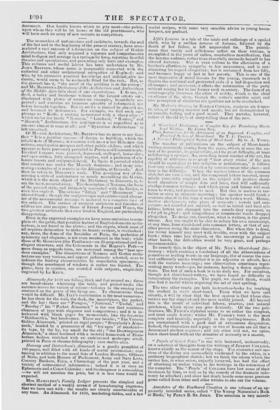ShAt.hand IKetionary, or Complete Key fur Translating Short- hand tF,itinq,
By JAMES NYE. Plain Instructiow: frr the Attainment (yr an Improved, Complete, and Practical Srp.h in of Short-hand. By T. C. FOSTER. . I V,w and Philosophical :System qf Shorthand. By 0. A. TYSON.
The number of publications on the subject of Short-hand- writing, constantly issuing, from the prese, attests at once the ex- tent of its practice, its great utility, an 1 its great ditliculty, at least in following a speaker. As, according toone teacher of the art, the rapidity of utterance is so great " that every stroke of the pen should be equivalent to two syllables or articulations," it follows that very extensive abbreviation by omission must take place : and here is the difficulty. When the useless letters of the common alphabet are struck out, and the compound letters inserted, many minds constantly employed on the subject will produce short- hand alphabets of simple dots and lines, that will sufficiently abridge common writing and which pains and labour will soon learn to write, and practice to read. But this is useless in ver- batim or even in accurate reporting ; the speaker would finish a sentence almost in the time it would take to write a word. Hence, further absidgments take place of necessity : vowels and con- sonants not sounded are omitted, as well as initial and final syl- lables; letters are changed into the sounds they represent, as v for ph in phial: and insignificant or immaterial words dropped altogether. To make out, therefore, what is written, is the grand labour. Any one ought to be able to reduce his own manuscript, at any time, from shot tshand into common letters, or that of any other person using the same characters. But when this is done, the writer himself may meet with trouble, even with the subject fresh : when time has elapsed, or the manuscript is placed in other hands, the difficulties would be very great, and perhaps insurmountable.
To remedy this, is the object of Mr. NYE'S Short-hand Dic- tionary: which contains a vocabulary of all the abbreviations of primitive or leading words in our language, (for of course the con- text sufficiently marks whether it is an adjective or adverb, Seca with the various meanings ; one abbreviation sometimes repre- senting many words—pie, for instance, having a dozen significa- lions. The test of such a book is in its daily use. For ourselves, though not short-hand-writers, we have found no difficulty in interpreting the examples. The pupil, we should think, would also find it useful whilst acquiring the art of curt spelling.
The two other tracts are both instruction-books for teaching the student to write short-hand. From what we have said already, it will be clear that the best system is that whose cha- racters are the simplest and the most readily joined. All beyond this is the result of individual labour, practice, and natural quickness, which alone can give dexterity. Of the two pub- lications, Mr:re-senses alphabet seems to us rather the simplest, and most easily learnt; whilst Mr. FOSTER'S tract is the most complete and masterly, especially in its spelling-lessons. Both ate encumbered with a goad deal of extraneous disquisition. Indeed, the characters and a page or two of lessons are all that a determined student requires ; and any other will not, we opine, learn short-hand without the stimulus of necessity or a master,


























 Previous page
Previous page